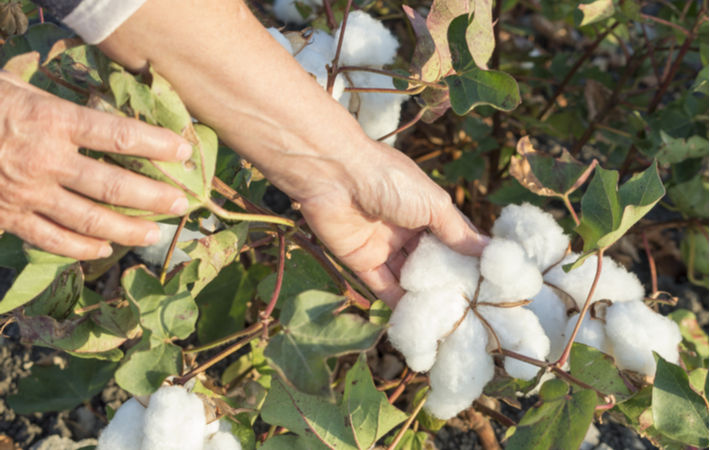Interviews
Togo's cotton production drops by 43% to 67000 tonnes in 2020-21
06 Jul '21
2 min read

Pic: Shutterstock
The 2020-2021 cotton season was a big blow for Togo, which produced only 67,000 tonnes of cotton, a considerable drop of 43 per cent compared to the previous year (116,000 tonnes). Factors for the low output include poor quality of cotton seed and floods in the northern part. The drop in the price of cotton seed has also pushed many farmers to turn to other crops.
The government, however, wants to revitalise this strategic sector through its recent privatisation and industrialisation efforts to make ‘white gold’ a source of income and employment.
Eyeing the success of privatisation in neighbouring Benin, Togo last December sold 51 per cent of its stake in its largest cotton producer, the New Cotton Company of Togo (NSCT), to Singaporean agricultural conglomerate Olam International. NSCT says it aims to produce 135,000 tonnes next year and 225,000 by 2025.
NCST chairman Simfeitcheou Pre last month briefed the media about the factors behind the drop in output.
"At least 40,000 cotton farmers out of 153,000 abandoned their crop during the past season," Koussouwe Kouroufei, president of the National Federation of Cotton Producers' Groups (FNGPC), was quoted as saying by media reports.
Cotton contributes only 1-4.3 per cent of the country's gross domestic product (GDP) and employs only 500,000 people out of a population of 8 million.
As Togo has imposed strict emergency sanitary measures beginning April last year, the decision has indirectly dealt a blow to its agriculture-dependent economy that relies heavily on cross-border trade. Exports to neighbouring nations like Ghana, Benin and Ivory Coast are on a hold.
The World Bank last year said in a report that the combination of closed borders, social distancing measures and restrictions on travel had delivered a heavy blow to Togo's economic activity.
The government in Togo has retained 24 per cent of NSCT shares and the farmers' association 25 per cent. Under its new terms of operation, NSCT will be responsible for all cotton activities in the country, including supporting producers with fertilisers, ginning and sale.
A processing factory is also being built in a new industrial zone, Adetikope, about 20 kilometres south of the capital Lome, with a capacity to produce 5,000 tonnes of fibre by 2022 and 25,000 tonnes over the next three years.
The government, however, wants to revitalise this strategic sector through its recent privatisation and industrialisation efforts to make ‘white gold’ a source of income and employment.
Eyeing the success of privatisation in neighbouring Benin, Togo last December sold 51 per cent of its stake in its largest cotton producer, the New Cotton Company of Togo (NSCT), to Singaporean agricultural conglomerate Olam International. NSCT says it aims to produce 135,000 tonnes next year and 225,000 by 2025.
NCST chairman Simfeitcheou Pre last month briefed the media about the factors behind the drop in output.
"At least 40,000 cotton farmers out of 153,000 abandoned their crop during the past season," Koussouwe Kouroufei, president of the National Federation of Cotton Producers' Groups (FNGPC), was quoted as saying by media reports.
Cotton contributes only 1-4.3 per cent of the country's gross domestic product (GDP) and employs only 500,000 people out of a population of 8 million.
As Togo has imposed strict emergency sanitary measures beginning April last year, the decision has indirectly dealt a blow to its agriculture-dependent economy that relies heavily on cross-border trade. Exports to neighbouring nations like Ghana, Benin and Ivory Coast are on a hold.
The World Bank last year said in a report that the combination of closed borders, social distancing measures and restrictions on travel had delivered a heavy blow to Togo's economic activity.
The government in Togo has retained 24 per cent of NSCT shares and the farmers' association 25 per cent. Under its new terms of operation, NSCT will be responsible for all cotton activities in the country, including supporting producers with fertilisers, ginning and sale.
A processing factory is also being built in a new industrial zone, Adetikope, about 20 kilometres south of the capital Lome, with a capacity to produce 5,000 tonnes of fibre by 2022 and 25,000 tonnes over the next three years.
Fibre2Fashion News Desk (DS)
Popular News
Leave your Comments
Editor’s Pick
































-Ltd..jpg?tr=w-120,h-60,c-at_max,cm-pad_resize,bg-ffffff)





.jpg?tr=w-120,h-60,c-at_max,cm-pad_resize,bg-ffffff)
.jpg?tr=w-120,h-60,c-at_max,cm-pad_resize,bg-ffffff)






